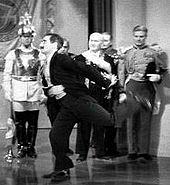- The Sailor's Hornpipe
-
The Sailor's Hornpipe (also known as The College Hornpipe and Jack's the Lad[1]) is a traditional hornpipe melody.
Contents
History
The usual tune for this dance was first printed as the "College Hornpipe" in 1797 or 1798 by J. Dale of London. [2]. It was found in manuscript collections before then - for instance the fine syncopated version in the William Vickers manuscript, written on Tyneside, dated 1770 [3]. The dance imitates the life of a sailor and their duties aboard ship. Sailors from the Royal Navy are believed to have invented the solo dance, as an exercise aboard ship[4]. Due to the small space that the dance required, and no need for a partner, the dance was popular on-board ship[5].
It is likely that the Sailor's Hornpipe was originally performed on the wet deck of a ship, in bare feet[4]. Accompaniment may have been the music of a tin whistle or, from the 19th century, a squeezebox. Samuel Pepys referred to it in his diary as "The Jig of the Ship" and Captain Cook, who took a piper on at least one voyage, is noted to have ordered his men to dance the hornpipe in order to keep them in good health[5]. The dance on-ship became less common when fiddlers ceased to be included in ships' crew members[6].
In dramatic stage productions, from around the sixteenth century, a popular feature was a sea dance[6]. But the nineteenth century saw the more familiar form of the "sailors’ hornpipe" introduced[6]. Nautical duties (for example the hauling of ropes, rowing, climbing the rigging and saluting) provided the dance movements[6].
In artistic and popular culture
The tune is one of the movements in Sir Henry Wood's Fantasia on British Sea Songs.
John Philip Sousa included the number as part of his "Jack Tar March".
American composer Charles Ives quotes the tune in the "Washington's Birthday" movement in his A Symphony: New England Holidays.
Groucho Marx does the traditional dance to this number at one point, as part of the opening number in the film, Duck Soup.
Donald Duck dances to the melody during his debut appearance in The Wise Little Hen (1934).
In the 1941 children's novel The Moffats by Eleanor Estes, Joey Moffat is supposed to do the hornpipe in a dancing school recital. Overcome by stage fright, he can't remember the steps until a tiny lap dog -- formerly a sailor's pet -- hears the music and jumps into the center of the floor to take up the dance.
Jenny Linsky, the feline protagonist of Esther Averill's children's books about Jenny and the Cat Club, learns the Sailor's Hornpipe from her owner Captain Tinker. She does the dance and teaches it to other cats throughout the series.
The piece's opening melody is quoted in the Gilligan's Island theme song, "The Ballad of Gilligan's Island."
The tune was played in the animated Popeye cartoons beginning in the 1930s, usually as the first part of the opening credits theme, which then segued into an instrumental of "I'm Popeye the Sailor Man".
The tune was played under the opening credits of the 1947 WB cartoon Buccaneer Bunny. The tune was played on the track and the dance was performed by Sylvester the cat in the 1948 WB cartoon Back Alley Op-Roar.
The tune framed the final track ("Symphony of the Seas") of the 1980s album, Hooked on Classics, Volume 3.
The Sailor's Hornpipe is the finale of part two of Mike Oldfield's Tubular Bells. It was also the inspiration for the track "Moonshine" from his Tubular Bells II.
In the Gilbert and Sullivan operetta "H.M.S. Pinafore", Sir Joseph Porter tells Ralph Rackstraw "All sailors should dance hornpipes. I will teach you one this evening". In their later operetta, Utopia, Limited, a slower version of the melody introduces "Captain Corcoran, K.C.B."
The song also appears in Disney's Alice in Wonderland, sung with lyrics.
George Malcolm, 20th century English harpsichordist and conductor, wrote a harpsichord piece called "Bach before the Mast", a humorous set of variations on The Sailor's Hornpipe in the style of Johann Sebastian Bach.
Along with George Malcolm's piece, Keith Emerson plays his own version of the tune on his solo album Honky - "a full-fledged rocking strut with a Caribbean twist" (Allmusic).
In the television show Futurama, the jingle for Popplers is set to the tune of The Sailor's Hornpipe (Season 2 Episode 15: The Problem with Popplers).
This song plays during part of the ending in the Xbox Live Arcade game Castle Crashers.
Noel Rawsthorne wrote a set of variations on the tune, "Hornpipe Humoresque", with apologies to Bach (a variation conflating the tune with the first movement of Brandenburg Concerto No. 3), Vivaldi (the first movement of "Spring" from The Four Seasons), Arne (Rule Britannia), and Widor (Toccata from Organ Symphony No. 5).
A whistled version of the melody is used by UK group Madness on their 1985 hit "Uncle Sam".
A segment of the melody is sung by Roger Jackson as the character Reginald Van Winslow in the first chapter of the Tales of Monkey Island video game, released in 2009.
The tune also features in the film The Warrior's Way during a fight scene.
In "Ride the Roller Coaster" the Kidsongs Kids who are dressed up as pirates sing this song and rename it "A Pirate's Life is a Life for Me".
Recordings
This tune has been recorded by:
- Mike Oldfield on Tubular Bells (1973) and Tubular Bells 2003 (2003)
- Achim Reichel as “Piratentanz” on Klabautermann (1977)
- Quilty on A Drop of Pure (1995)
- Carlos Núñez on Cinema Do Mar (2005)
- Broadside Electric, on Black-edged Visiting Card
References
- ^ MacJams.com - Song: The Sailor's Hornpipe by Andronis
- ^ SAIL AWAY LADIES [1A]
- ^ http://www.asaplive.com/archive/index.asp
- ^ a b http://jrssd.potts.net.au/dances/the_sailor's_hornpipe.htm>
- ^ a b What are the origins of the sailor’s hornpipe? : Frequently asked questions : Maritime, sea & ships : Fact files & in-depth : Learning : NMM
Categories:- Dances
- Maritime music
Wikimedia Foundation. 2010.


